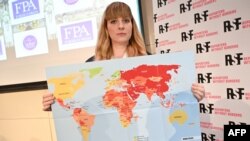As the world marks World Press Freedom Day on May 3, leaders and international organizations are stressing the importance of protecting journalists, who increasingly face threats around the world.
This year’s theme, “Journalism Under Digital Siege,” highlights the ways journalists are attacked by surveillance and digital tools.
U.N. Secretary-General Antonio Guterres said threats to journalists and media workers are “growing by the day.”
“From global health to climate crisis, corruption and human rights abuses, they face increased politicization of their work and attempts to silence them from many sides,” Guterres said in a video message published Tuesday.
In its 2022 World Press Freedom Index released Tuesday, Paris-based Reporters Without Borders (RSF), said Russia’s invasion of Ukraine has contributed vastly to the spread of fake news and propaganda.
U.S. President Joe Biden said the world lives “in perilous times for press freedom,” referencing journalists killed and wounded in Russia’s war on Ukraine, as well as Moscow’s total control over the media inside Russia.
“Journalists cover war, expose corruption, document environmental damage, lift up the marginalized, champion our communities, and hold the powerful to account,” Biden said in a statement on Tuesday. “And for this, too often, they are killed, jailed, raped, threatened and harassed. Women journalists, long a minority in the newsroom, are disproportionately targeted, on- and offline, in these attacks.”
The U.S. president said the world “collectively” should do more “to protect and sustain independent media, and to hold to account those that seek to silence voices essential to transparent, trustworthy, and responsive governance.”
The United States remains committed “to champion fact-based reporting and independent media globally,” Biden said.
U.S. Secretary of State Antony Blinken also highlighted the sacrifices made by journalists reporting from conflict zones, referring to those killed in the Ukrainian conflict, including RFE/RL journalist Vira Hyrych, who was killed last week in a Russian airstrike that hit the residential building where she lived in the Ukrainian capital, Kyiv.
“The Kremlin's war of aggression on Ukraine is just one of many conflicts around the globe where journalists are putting their lives on the line right now, as we speak, as we gather, in order to report the news,” Blinken said in remarks May 3 at the Foreign Press Center in Washington in recognition of World Press Freedom Day.
He said other governments use the threat of imprisonment and lawsuits to intimidate journalists.
“In Afghanistan, the Taliban have systematically repressed the Afghan independent press, particularly women journalists, and those working in rural areas,” Blinken said.
Congressional resolutions
In the U.S. House of Representatives, a bipartisan congressional caucus introduced a resolution highlighting the importance of an independent press, condemning threats against journalists, and reaffirming the U.S. commitment to promoting and defending freedom of the press at home and around the world.
In the U.S. Senate, a similar resolution was introduced by the Foreign Relations Committee, which is aimed at “recognizing widening threats to press freedom and free expression around the world, and reaffirming the vital role that a free and independent press plays in combating the growing threat of authoritarianism, countering misinformation and disinformation, documenting human rights abuses.”
Journalists’ safety
With threats growing against journalists in conflict zones and elsewhere around the world, news organizations and international bodies are calling for more steps to ensure the safety of journalists.
During a keynote address at the Academic Conference on the Safety of Journalists during the UNESCO World Press Freedom Global Conference at Punta del Este, Uruguay, acting VOA Director Yolanda López on Tuesday stressed the importance of establishing safety protocols to protect journalists everywhere.
“If we think that a free press truly is one of the pillars of a free society, then protecting our journalists to help them do their jobs is everybody’s responsibility,” she said.
During the academic conference, which meets each year to present new research into threats against journalists, a joint statement signed by Abdulla Shahid, president of the United Nations General Assembly; Santiago Irazabal Mourao, president of the General Conference of UNESCO; and Federico Villegas, president of the U.N. Human Rights Council, called on member states, regional bodies and civil society groups to join forces in furthering the objectives of a U.N. plan of action about protecting journalists.





